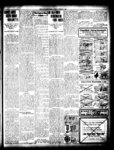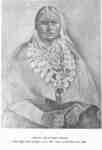Currey Gives Facts About Ouilmette
- Publication
- Lake Shore News (Wilmette, Illinois), 1 Jan 1915, p. 3
- Full Text
The name of Wilmette, the Frenchman, of whom we shall here give some account, was originally spelled Ouilmette, after the manner of many proper names in the west given by the old discoverers. For example, the name of Wisconsin, was originally spelled Ouisconsin, the name Wabash, Ouabache, and there are numerous other instances.
Antoine Ouilmette came to Chicago in 1790, thus antedating in his arrival the building of old Fort Dearborn by some thirteen years. He was in the employoment of the American Fur company. Frank R. Grover wrote a pamphlet some years ago the subject of which was Ouilmette's early history. This pamphlet was issued as one of the publications of the Evanston Historical Society, and contains the most complete account of this pioneer resident extant at this time. Mr. Grover says in the course of his work, "This striking [unclear] in our local history, and in the very early history of Chicago, is sadly neglected in most if not all the historical writings. Almost every one in this locality knows that the village of Wilmette was named after him; many misinformed people speak of Ouilmette as an Indian chief; a few of the writers merely mention his name as one of the early settlers of Chicago. And that has been the beginning and end of his written history."
Loved the Hardships
"Ouilmette," says Grover, "was a type of the early French voyageurs, who lived and died among their Indian friends, loving more the hardships and excitement of the western frontier than the easier life of eastern civilization." He married a squaw of the Pottawatomie tribe of Indians whose name was Archange. Her name is frequently mentioned in transfers of property within the bounds of the old Wilmette reservation. In Mr. Grover's work the origin of the reservation and many other interesting particulars are given.
The name of the village of Wilmette was suggested by the late Judge Henry W. Blodgett of Waukegan, who was interested in the early real estate transactions of the village. The "reservation" consisted of two sections of land lying almost wholly within the present boundaries of Wilmette, and was authorised by the treaty of [illegible], concluded at Prairie du Chien on July 29 of that year, between the United States and several tribes of Indians. Among the provisions of land for Indians and others the following clause refers to the reservations: "To Archange Ouilmette, a Pottawatomie woman, wife of Antoine, two sections for herself and her children on Lake Michigan," etc. The land was not surveyed until 1843, when a patent was issued in due form. Ouilmette, however, had established himself and family at some place within the present limits of the land described in the treaty, referred to above as the Wilmette reservation, about the time the treaty was concluded. Alexander McDaniel, who made his first visit tothe north shore in 1836, found Ouilmette and his family living in a log cabin. There were eight children in the family at that time, "very comley, well dressed and intelligent, " he says. The Ouilmettes "owned cattle, horses, wagons, carriages and farming implements, and worked a large tract of land."
Two Ways of Spelling
It is rather peculiar that some of the pioneers in their old age remembered that Ouilmette's name was pronounced as if it were spelled Ouimette. R. F. Hill, as stated to the writer, and so did Mrs. McDaniel. Ouilmette himself apparently was illiterate, as the facsimilie of a letter in the possession of the Evanston Historical Society, dictated by him in 1839, and signed by a mark, shows. It is quite likely that he accepted any pronunciation that was agreeable to his neighbors.
Throughout the period of the French domination there were numerous instances of white men voluntarily joining Indian tribes, adopting their ways of living and becoming thoroughly weaned from civilization. Men would go into the woods in company with Indians and never return to their former associates and when occasionally they were met with by traders or missionaries they could not be induced to abandon the free wild life of the red men. And even when the life among the Indians was not adopted from choice, as in the case of captives, it frequently happend that attachments were formed and the [unclear] became permanent. An authentic instance may be related as an illustration.
A girl named Frances Slocum was stolen by Indians from her parents and grew up among them. No word was heard from her for sixty years, when by chance her brother learned that a white woman was living with a distant tribe, and he made a long journey to ascertain [unclear] be his sister.
She proved to be the long lost Frances, but she could not understand a word he said, nor could he understand the Indian language she spoke. She was found living like the Indians and seemed entirely contented. When asked if she would return with her brother she replied: "No, I cannot; I have always lived with the Indians; they have always treated me kindly. I am used to them. Why would I go to be like a fish out of water?" And when further urged she said: "I cannot. I am an old tree. I cannot move about. I shall not be happy with my white relatives. I am glad to see them, but I cannot go. I have done." Nothing more could be said, and Frances Slocum ended her life among her Indian friends.
Remained in the Cabin with his Wife
At the Fort Dearborn massacre in 1813 Ouilmette remained in his cabin with his Indian wife, Archange. He belonged to John Kinzie's establishment at the time, and lived in a small cabin at the rear of the "Kinzie mansion." The hostile Pottawatomies regarded him as one of themselves and he was not molested. He never lifted a hand or raised a voice to stay the atrocities being perpetrated almost before his eyes, of which his fellow whites were the victims. However, his squaw wife and her sister, especially the latter, were able to befriend some of the poor fugitives at a critical time after the tragedy had taken place, as related in Grover's work, and also in "The Story of Old Fort Dearborn" by the present writer. In the several treaties made after the war, Archange was named as a beneficiary, presumably in consideration of services. After the massacre all the white settlers of the neighborhood fled from the place except Ouilmette, who with his Indian wife, remained, and he was the only white resident of Chicago until the arrival of some traders a few months later.
In 1825 Ouilmette's name appears in a list of fourteen tax-payers in Chicago, his property being valued at $100 on which he paid a tax of $1. He joined with others in 1833 in a petition to the Catholic bishop in St. Louis asking for the establishment of a Catholic church at Chicago. This resulted in the formation of St. Mary's church, the first church organization of the fast growing "town of Chicago."
Lived on the North Shore
In the later "twenties" Ouilmette, and his family, occupied land on the north shore as mentioned above. He lived here until after the general removal of the tribes to reservations in the west. With his family he followed his tribe and remained with them except for occasional visits made by him to this part of the country in his old age. His death occurred at Council Bluffs, December 1, 1841. B. F. Hill [Benjamin Franklin Hill], who had seen him a few years before his death, described him as "a very old man, rather small of stature, dark-skinned, and bowed with age." William Carney remembered seeing him when a boy passing along the old Gren Bay trail on foot, always carrying a bag over his shoulders. Carney's mother used to threaten the boy with punishment for misconduct by saying "she wold give him to Old Ouilmette," who would "put him in his bag and carry him away to his squaw."
Antoine Ouilmette has the distinction, among the very oldest of our pioneers, of having lived continuously at Chicago and its vicinity throughout a period longer than forty-five years. Considering he fact that his life was ended in 1841, the earlier passages of our history as illustrated by Ouilmette's period are shown to have a long reach into the past.- Featured Link
- Creator
- J. Seymour Currey
- Media Type
- Newspaper
- Item Types
- Articles
- Clippings
- Notes
- Date of Publication
- 1 Jan 1915
- Subject(s)
- Corporate Name(s)
- Wilmette (Ill.)
- Local identifier
- Wilmette.News.298472
- Language of Item
- English
- Geographic Coverage
-
-
Illinois, United States
Latitude: 42.07225 Longitude: -87.72284
-
- Copyright Statement
- Copyright status unknown. Responsibility for determining the copyright status and any use rests exclusively with the user.
- Contact
- Wilmette Public LibraryEmail:refdesk@wilmettelibrary.info
Website:
Agency street/mail address:1242 Wilmette Avenue
Wilmette, IL
60091-2558
U.S.A. Phone: 847-256-6930




